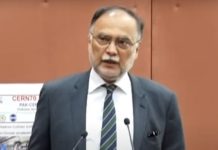ISLAMABAD: The Supreme Court’s Registrar Office on Tuesday rejected the application moved by the Pakistan Tehreek-e-Insaf (PTI) challenging the appointment of Mohsin Naqvi as the caretaker chief minister of Punjab, citing a number of objections including “scandalous language” used in the petition.
The plea was moved on January 27 by PTI General-Secretary Asad Umar and challenged the appointment of the interim chief minister, along with the appointments of Raja Riaz as the Opposition leader in the National Assembly, and members of the Election Commission of Pakistan (ECP).
The petition — moved under Article 184(3) of the Constitution — argued that Naqvi had no political, administrative and legal experience in ensuring the rule of law, working mechanism of governments, bureaucracy, requirements of law and or the Constitution.
In a document issued by the registrar’s office earlier in the day, the office has observed that the petition is “not entertainable.” Reasons cited by the country’s topmost judicial authority for returning the plea point out mostly technical issues that nullify the petition. The first point of concern raised by the registrar’s office takes issue with the Article under which the petition was raised.
Under Articles 184(3), the Supreme Court can, if it considers that a question of public importance with reference to the enforcement of any of the Fundamental Rights is involved, have the power to make an original jurisdiction in any dispute between any two or more governments.
However, the office of the registrar claims that the plea does not “point out as to what questions of a public importance in the instant case are involved with reference to enforcement of any of the Fundamental Rights… so as to directly invoke jurisdiction of the Supreme Court” under the cited article.
Moreover, the notice issued claimed that since the notice sent to the respondent was not “properly drawn” — given that it does not mention why it was being filed nor was a copy of the petition provided to the respondent — the petition could not be entertained.
The higher court also claimed that since no other forum capable of resolving the issue had been approached and no justification was given by the PTI’s petition for evading all other forums was provided, the court was compelled to disregard the petition. Another issue pointed out in the document related to the procedure of filing such an application.
“The certificate provided at page 15 of this Constitution Petition does not fulfill the requirements of Rule 6 of Order XXV of the Supreme Court Rules, 1980,” stated the document from the registrar, adding that “no proof/resolution to the effect that petitioner is General Secretary of Pakistan Tehreek-e-Insaf and filing the petition on behalf of said political party.”
Furthermore, the petition moved by the PTI senior leader was also criticised for having multiple issues cited in the same plea. The SC document stated, “misconceiving multifarious prayers have been made in one Constitution Petition.”
Disparaging the plea for other technical issues the court order said that the petition not only contained “scandalous language” but was also displayed to irrelevant parties, while the interim chief himself was impleaded as respondent No 7. The document claimed that “he cannot be impleaded as party under Article 248 of the constitution”.
The cited article states: “The President, a Governor, the Prime Minister, a Federal Minister, a Minister of State, the Chief Minister and a Provincial Minister shall not be answerable to any court for the exercise of powers and performance of functions of their respective offices or for any act done or purported to be done in the exercise of those powers and performance of those functions.”
Since the constitution itself purports that a chief minister cannot be held accountable by the court of law, adding his name to the list of responders nullified the petition.
It must be remembered that the petition moved by the PTI on Friday claimed that the caretaker chief minister “ought to possess certain but necessary intellectual and relative experience as well as characteristics which is to ensure that the appointed caretaker chief minister, is better equipped with expertise required for the office of the chief minister”.
PTI’s petition claimed that Naqvi’s lack of experience in political, constitutional, bureaucratic set-ups made his appointment suspect. That petition had also taken issue with the ECP and the way it had appointed Naqvi, stating that the electoral body had not made available its reasons for its selection of Naqvi. –Agencies






